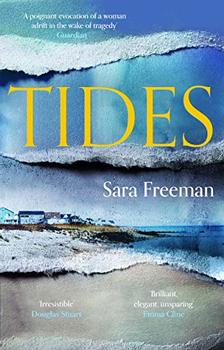Summary | Excerpt | Reviews | Beyond the Book | Readalikes | Genres & Themes | Author Bio

She asks around at the hostel, and they tell her she is right: the prettiest beaches are cut off by the houses. It wasn't always like this, they say, the coastline so private and all. Some of the richest families used to turn a blind eye, but not anymore. In a few weeks, once the season is over, then that's a whole different story. For now there's the public beach, of course, but that's nothing to write home about. That's good, because she's not planning to write home about anything. They laugh, hearing her say this, and she thinks for a moment that nothing much has changed: she can say a few words in the right order and get people to love her for a moment.
She finds it, flanked by the supermarket and the garden center: a slip of public sand. There is an orange tent set up at the far end of the beach and two pairs of swollen, mangled feet sticking out. When she walks by, the screen is zipped halfway down, so that she can't see any faces, she can only hear the syncopated sound of their snoring.
She wonders what she will do when the money runs out. The thought is sticky, the first one like this, insisting on its own importance. It seems absurd somehow, that she must think of it, make something of this thought. The beach ends and there is a large expanse of dark, jagged rocks. She walks across the fraught ground, canvas shoes sliding dangerously beneath her. She slips and catches herself then slips again and falls hard on the rock. Not pain, just the feeling of everything coming up from within. She sits there, looking around, for someone, a witness to her fall, a hand to grip as she steadies herself back up. But there is no one, just the dome of orange light tented in the distance.
She buys a large lemonade filled with crushed ice and drinks it until her teeth and brain are numb. She shuts her eyes hard and when she opens them again, she is surprised to find that everything is still there: the lemonade truck, a few waves quietly churning in the distance, the sand, dank and gray, waiting to be touched.
She wakes one morning, clutching her stomach. No time has passed; her husband is by her side. He touches her rounded stomach with his palm. Nearly there, he says, speaking into her belly button. She is awake now, her palm on her own skin, the fingers cold and thin. Her belly is nearly concave, more than empty. She has been gone for three days, maybe four, or maybe it is six, and since then she has eaten a sleeve of saltines, some peanut butter from a spoon, a few beers, a lemonade, some fries and some licorice. She is saving money; she doesn't have much left. One thousand seven hundred and thirty-three. If she needs more, she'll turn the phone on, write her brother a message. He has never said no to her before. His only sister. She'll write to him and say something like this: I am changing. Or better yet: I have changed.
She sees children everywhere, in the flesh, but also in what they leave behind: striped swimsuits hanging over banisters and beach chairs, colorful pails discarded on the beach. When she sees them, children and their traces, she turns her head away. It is her head that does the turning. She speaks, as though defending herself before a jury: This is not about that.
At the town's small marina, day trippers clump around the seafood spot, composing their seaside shots: plush pink lobster rolls, heaped French fries snapped from above. In the background, a row of handsome wooden yachts, sterns wagging; a fisherman, sun-creased and smoking, unloading his mid-August catch. She doesn't stay long; the smell here makes her queasy. Fish entrails and sunscreen, cooking oil reused one time too many.
In a shop window along the main drag, she spots a letterpress sign: keep rome off the map. In this town, the patrician crowd don their modesty like a crown: beat-up station wagons, worn-in khakis, styles from thirty years past.
Excerpted from Tides by Sara Freeman. Copyright © 2022 by Sara Freeman. Excerpted by permission of Grove Press. All rights reserved. No part of this excerpt may be reproduced or reprinted without permission in writing from the publisher.
We should have a great fewer disputes in the world if words were taken for what they are
Click Here to find out who said this, as well as discovering other famous literary quotes!
Your guide toexceptional books
BookBrowse seeks out and recommends the best in contemporary fiction and nonfiction—books that not only engage and entertain but also deepen our understanding of ourselves and the world around us.